As I looked over the carnage that was the bond market yesterday, I was reminded of my piece 17 months ago called Broken?.? But as I read that, I said to myself, “Who are you kidding?? Yes, things were bad today, but nothing like when the bond market was falling apart out of fear of corporate credit risk.”
True enough, but I found yesterday disturbing.? Why?
1) Increasing chatter of troubles in the Eurozone, given Fitch’s downgrade of Portugal, and an increased insistence that Greece will not be bailed out, leading to a drop in the Euro.? Many say that it is impossible that the EU would not prop up Greece, but consider the German mindset here.? They traded their hard Deutschemarks for Euros.? They expect a hard Euro.? Their view is that if you want the benefit of being in the Euro, you must behave like Germans.? Anything else would be profoundly unfair — benefits come to those who have discipline.? There are two alternative views of what it means to be in the Eurozone, and they can’t be reconciled.? At most, one of those views will survive.? I think the German version is more likely.
My view is by no means the consensus, but without Germany on board, there is no Greek bailout.? The IMF is too small to truly help Greece.? If Greece were to default, it would harm banks in Europe, but it is a lot cheaper to help local banks than to help Greece.? That makes me a little bullish on the Euro, because if Greece defaults and leave the Eurozone, it sends a warning to other profligate nations, and leaves the core of the Eurozone stronger.? Beyond that, vacations in Greece would become the rage, as they would be very cheap, even including the frictions of exchanging Euros into “New Drachmas.”
Here’s a 12-month graph of the Euro:
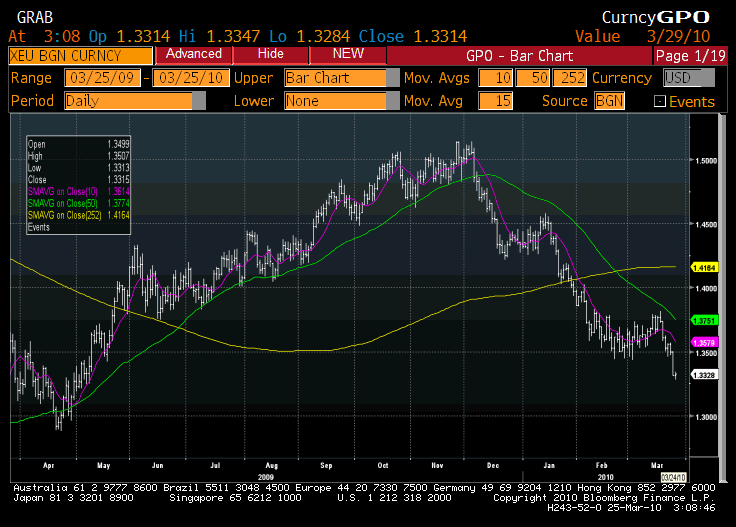
My view is that the Euro will weaken further if they bail out Greece, and rally if they don’t.? Guess which the Germans will choose?? They will favor a strong Euro, even if it means shrinking the Eurozone.
2) I want to find the guy(s) who taught me when I was a young and impressionable mortgage bond manager (age 38, I came to the game late) that swap spreads could not go negative; sorry, it ain’t true.? John Jansen used to complain about the 30-year swap spread, but now we are negative at 10 and 7 years as well, and 5 years is not far away at +7 basis points.
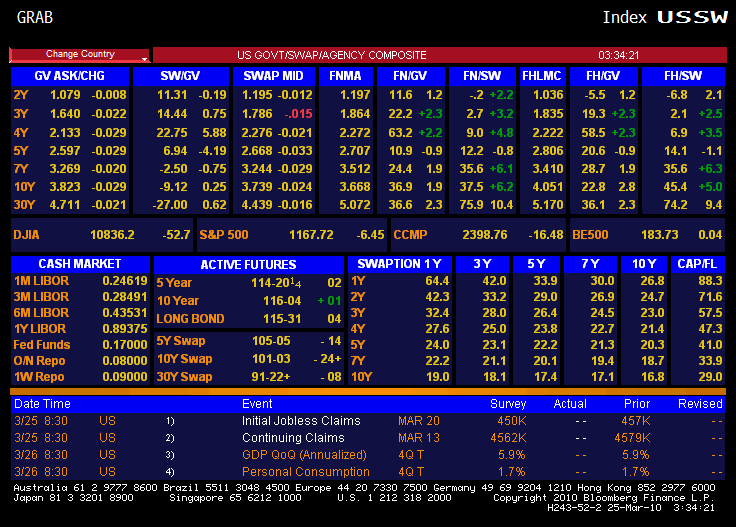
But why?? If swap yields represent the levels that AA banks fund at, then how can they yield less than a AAA government?
Here’s my answer, though there are other good ideas to consider.? As a corporate bond manager, I underweighted two names that I really did not like, GE and AIG.? Though AAA, they traded as if they were single-A, and they had a lot of debt outstanding.? I always felt they were too levered, and that the rating agencies were giving them too much credit for being big.? Having run the GIC desk of a small well-capitalized insurer, with lower ratings, less leverage, and a higher ROE than other larger competitors, I was/am biased against firms with bad credit profiles that get good ratings only because they are big.? That they could fail is not conceivable.? Please ignore that AIG did fail, and that GE Capital would have failed in late 2008 or early 2009 without the TLGP.? The US Government played favorites, ignoring CIT, Advanta and others.
But, it is inconceivable the the US Government would fail.? That said it is issuing a lot of debt, and it is hard to absorb it all, so yields have to widen.? Very highly rated corporates offer some diversification, so they trade at lower yields than the behemoth that needs more and more liquidity.? Look at the lousy 5-year auction yesterday.? The Street is choking on Treasury paper.
The move in Treasury yields was large, but not overwhelming, maybe 98th percentile in severity:
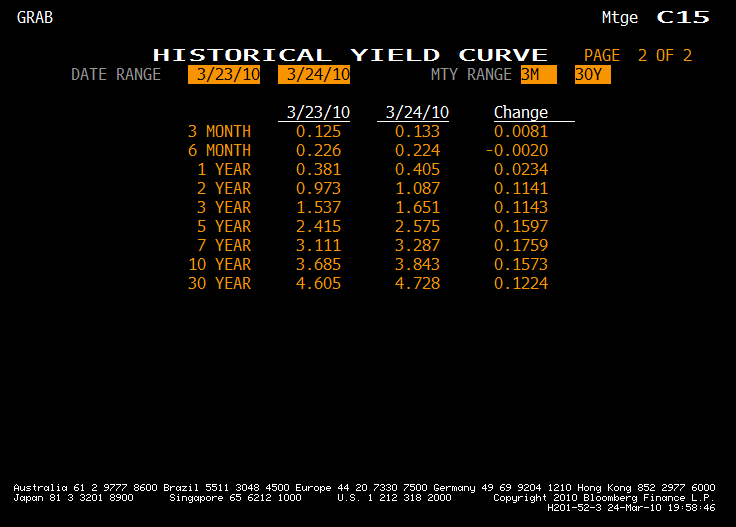
3) Then there was the move in mortgage bond yields.
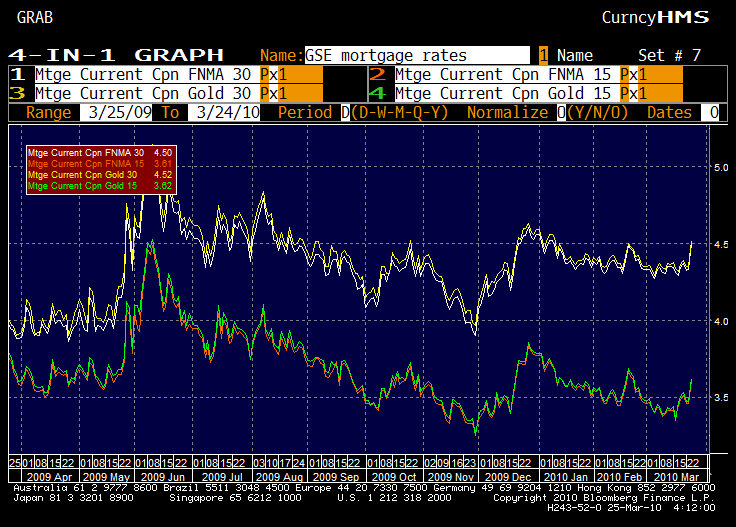
Up 15 basis points, near the Treasury move, but much more than the move in swaps, which are closer to how mortgages fund.
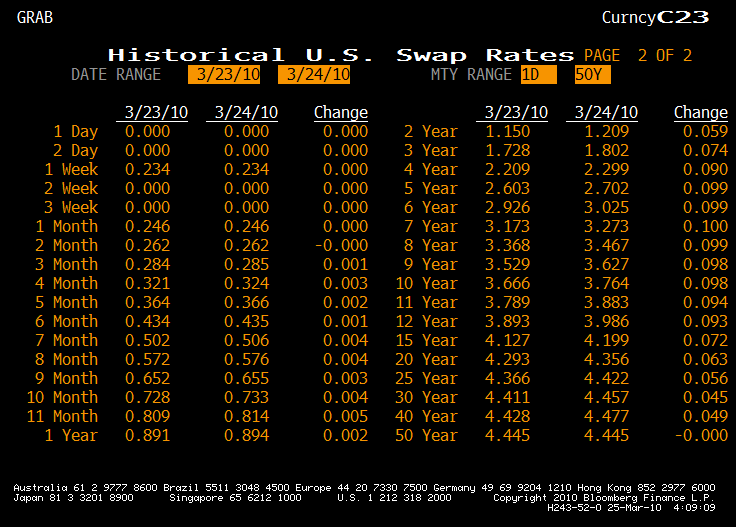
Looks like about a 10 basis point move, which means mortgages cheapened by 5 basis points or so.? That’s big!
Further, there was the change in the MOVE [Merrill Option VolatilityEstimate] index.? Think of it as the VIX for Treasury securities.? Up considerably:
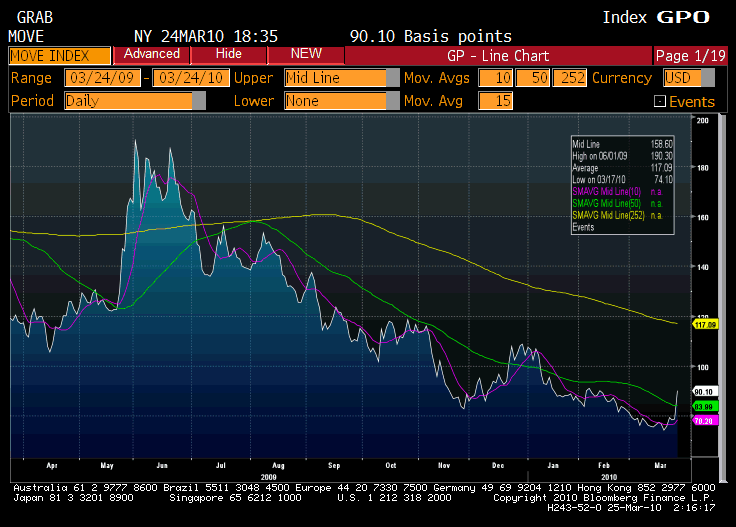
All of this is somewhat panicky in terms of feel.? Is this a turning point? If it is, how much steeper can the curve get, or will the Fed genuinely tighten?
4) On a day like this, where things are falling apart, it does not help to hear Bill Gross say that he likes stocks over bonds.? I know, this is not nearly as serious as the above three, but I agree with him, weakly.? Bonds don’t have much upside here.? Large cap high quality stocks, which are a decent proportion of the S&P 500, still seem cheap.? Maybe that is true only in a relative sense, but I will stick with Jeremy Grantham here.
Here are two more wrap-ups of the day:
Summary
Be careful.? We live in a world where few governments are following orthodox rules of finance.? Indebted governments may turn to inflation, or higher taxation, or default.? At present, there is no decided answer to what will likely happen.? Governments are still trying to figure it out, hoping that some marginal nation like Greece will choose a course of action that tells them what or what not to do.? In a sense, we are waiting for some entity to make a bold move that changes the game, and then others will decide whether to do that, or, the opposite action.? Until then, keep your powder dry, and be nimble.

“Guess which the Germans will choose? They will favor a strong Euro, even if it means shrinking the Eurozone.”
You got that wrong:
1. We have an important election coming in germany soon, where the current government might loose a lot, considering their performance up to now. Playing the role of iron chancellor might win Angela Merkel a few percent of the votes, especially since the media seems not to see the political cost of the mess this creates.
Engaging the european institutions in a power play also helps in the current climate in germany – we are quite sceptical of the EU now.
2. German economics is still focussed on exports, and a weak euro is supposed to help them.
Germany will help the parties of the current government, and if those greeks can’t get help: just too bad.
We don’t have responsible leadership at the moment.
Regards, Uwe
Is the Fannie 10yr quote wrong? 3.82 vs 3.67? Looks odd.
Sam, yes, a bad value in the middle of the night. I should have taken screenshots at the close.
Nice summary.
Perhaps the jitteriness is just everyone wondering whether the end of QE will be a turning point?
In an earlier post, you mentioned unsustainable credit trends at turning points. One interesting data point: In the recent Greenspan paper there is a chart of CCC spreads. As of 5 March, the CCC spread was clearly tighter than its historical average. Surely this is on the basis of momentum demand for high yield mutual funds, not fundamentals.
But I would still expect a trigger event from either the treasury market (end of QE) or municipals (disasters all around), not corporates (lots of recent issuance delaying default).
Jim Fickett
ClearOnMoney.com
It appears the choices are narrowing. Not just here. Pick a zone or trading block.
Here’s the offer: 1. Clean out the garage and have a yard sale. For ten cents on the dollar.
2. Leave it to its own demise, as surely it will combust and take the house along with it.
Then again, Paul was struck by lighting before his conversion.